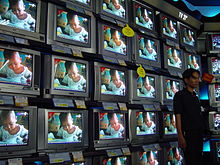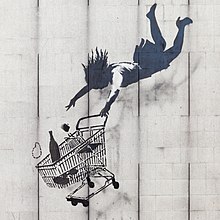Consumerism
With the Industrial Revolution, companies started to produce more goods that they would be able to sell. Overproduction occurs when there is more supply of a good than there is demand for it. Manufacturers use concepts such a planned obsolescence and advertising to manipulate consumer spending.[1] Consumerism is a concept to counter this: it tells people to buy more and more goods.

In 1899, Thorstein Veblen published a book on consumerism, called The Theory of the Leisure Class. In the book, Veblen looked at the widespread values and economic institutions which started with the widespread "leisure time" in the beginning of the 20th century. He also introduces the concepts of conspicuous and vicarious consumption and waste. All are related to display of status, and not on how useful or functional something is. Today, these kinds of goods are known as Veblen goods.
In economics, consumerism is used for economic policies that say that consumption is important. Consumers can choose freely what products they buy. Manufacturers should focus on the goods people want (and buy). Society should be organized accordingly.
People who prefer a simple life (sometimes called a slow life) and people who look at the effects of capitalism have criticized the concept of consumerism. Experts often say that there are physical limits to consumerism. An economy cannot grow without bounds; overconsumption is also a problem. Both have a direct impact on the environment, such as overexploitation of natural resources, or the increase in waste. Larger effects include climate change. Some research that criticizes the concept, says that consumerism also has an effect on society as a whole: it makes class barriers stronger, and increases inequalities.

References
change- ↑ Czarnecka, Barbara; Schivinski, Bruno (17 June 2019). "Do Consumers Acculturated to Global Consumer Culture Buy More Impulsively? The Moderating Role of Attitudes towards and Beliefs about Advertising" (PDF). Journal of Global Marketing. 32 (4): 219–238. doi:10.1080/08911762.2019.1600094. ISSN 0891-1762. S2CID 182181403.